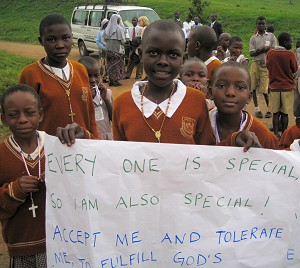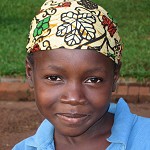 The aim of this project is to give children in the UK insight and knowledge into how families in Uganda live and to look at similarity and difference between the two cultures.
The aim of this project is to give children in the UK insight and knowledge into how families in Uganda live and to look at similarity and difference between the two cultures.
The parents, teachers and pupils in Uganda have provided the following information -
How we live in Uganda
What work do mothers do?
Mothers in the rural areas are generally busy in the gardens, this is a full time job as they usually have many mouths to feed. They also maintain the compound, sew clothes and cook the food. Also many of the mothers are involved in the church and attend choir.
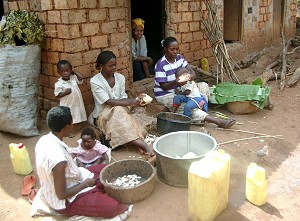 What work do fathers do?
What work do fathers do?
Fathers in the villages also are involved in the gardens, and do the heavy labour such as digging; they also do building work and look after the animals, such as cow herding.
How big are Ugandan families?
The average family size in usually six or more children.
What kind of houses do the Ugandan people live in?
'House sizes vary, but most houses are quite small, houses can be built from bricks, mud and wood, with timber roofs. Children usually share beds if they are small due to lack of space. Everybody in Uganda gets up early as they are very busy in the day and it is just part of their culture. Some have mosquito nets but most do not. For breakfast people can have chapattis or left over food from the night before; but most take porridge which is made from maize flour and water-with lots of sugar! Some families do not eat together with the men and women with professions such as teachers or nurses eating in a separate room to the women and children who eat on mats on the floor. The women do not see this as a bad thing, as it is their culture and often feel uncomfortable if having to eat with the men.
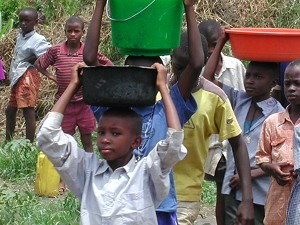 What is the pattern of a day for a family?
What is the pattern of a day for a family?
The school children will go to school early in the morning while the parents spend their day in the gardens or at other jobs, usually women and men work separately in the gardens. The children then come back from school and start doing chores alongside the mother while the father is resting. Men in the villages like to play Ludo and cards a lot with their friends. In the evening everybody takes food and then they go to bed, there is not much time for family leisure together, as they are all busy providing for the children and family.
Clans and tribes
The most important thing to Ugandans is family life, and the tribe and clan in which they come from. Ugandans have extremely strong family bonds, with the upmost respect for each other and especially their elders. Even outside of their families they show a huge amount of respect to all other members of their society. Ugandan culture is one of greetings and welcoming, if you visit some ones house you take a gift and they in return provide a generous welcome. Every time that you leave your home or place of work, you are welcomed back by saying 'Kulikayo', welcome back. Also 'Geybale' is the most common greeting and means 'well done', Ugandans are very appreciative of each other and like to thank each other for the work that is being done. In terms of housing, families live in close proximity, which is not a problem as they spend nearly all of their time outside working in the gardens or helping with the daily work. You can never find a Ugandan alone, as they love to socialise and it is strange if you see someone sitting alone when they are not doing anything. Ugandan society and culture is one in which people should work together, respect each other and behave in an appropriate way in accordance to their age and gender. Religion is also a major part of Ugandan society and nearly all the women and children attend church every Sunday, the men generally do not go as often because they are working. Prayers are also said before every meal and mass held regularly within the homes. Functions such as Weddings, Introductions and Burials are also very big events in which hundreds and hundreds of people attend to show their congratulations or condolences. When a person dies, people from all over the village will immediately go and stay at the home of the person that has died to show that they care. A bonfire is built and everyone stays up for the whole night saying prayers for the family and the person that has passed away. Ugandans always pull together as a community, which is very important to their culture.
What religion do the Ugandan People belong to?
There are many religions in Ugandan but the vast majority are Roman Catholic, Church of Uganda or Muslim. In the schools the children come from all religions and it is unusual for a school to have children from just one religious denomination.
Is education important in Ugandan Society?
Education is also highly important and families strive and work hard so that they are able to put their children into good education. People are also very generous and you find people that pay for their siblings, children's school fees as they can just about afford it where their siblings cannot. You also find people struggling to pay for their own needs and working hard, yet they are paying for their brother or sister to go to University. Graduation is celebrated highly, especially in the villages where it is an enormous achievement. So, generosity is another key part of Ugandan society and culture.
Example of a lesson in Uganda
Questions - Primary 3 and 4
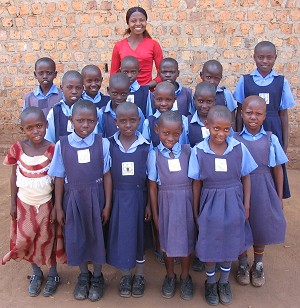 Section 1-Social Studies
Section 1-Social Studies
1 What is vegetation?
2 Give any one way of caring for physical features.
3 Define a river.
4 Give three uses of rivers and lakes.
Section 2- Science
1 What are flowering plants?
2 Mention any insect that is useful to people.
3 What is seed dressing?
4 What are biological changes?
Section 3-Mathematics
1 Round off 28910 to the nearest ten thousands.
2 Write in words 4105.77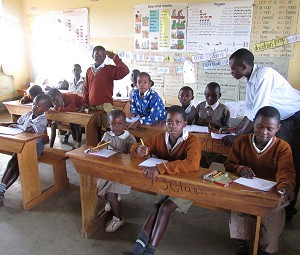 3 Convert 45 cm into metres.
3 Convert 45 cm into metres.
4 Find the factors of 24.
Section 4- English
Join the following sentences using the words given in brackets.
1 Annette is a very clever girl. Every person admires her. (Use...such a...that)
2 John will read the book. Amos will also read the book. (Begin. Either...)
Complete the similes:
3 As white as a...
4 As wise as a...
